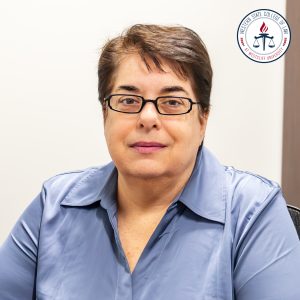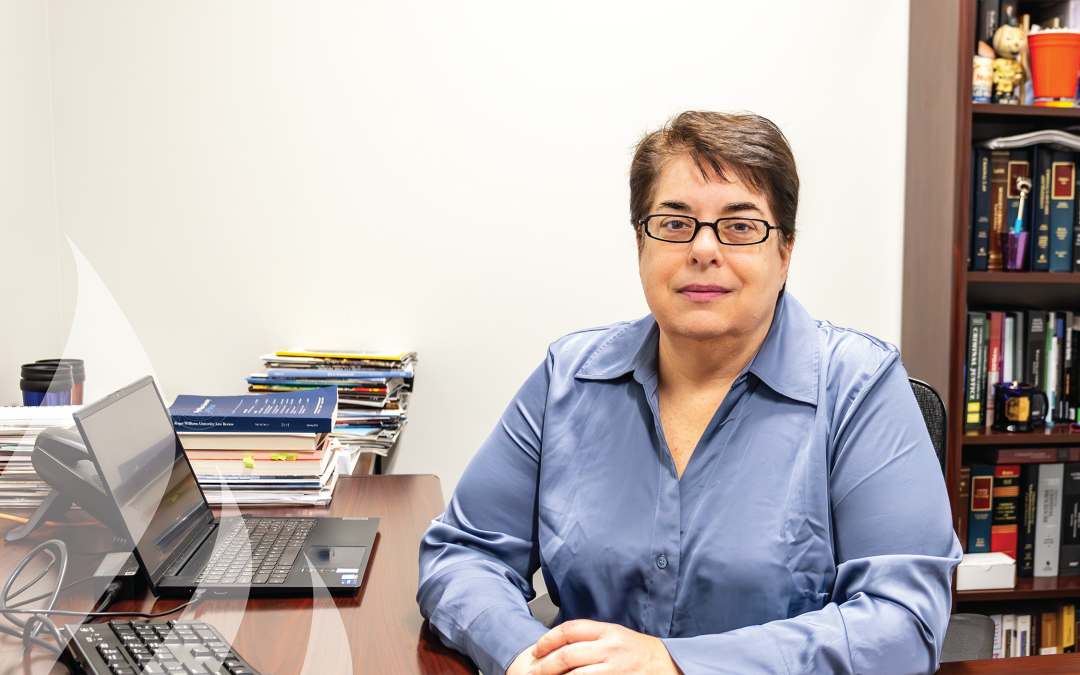Written by: WSCL Marketing Team
At Western State College of Law, the oldest law school in Orange County, inclusivity and social justice are core principles embodied by leaders like Professor Stacey L. Sobel. She serves as the Associate Dean of Research and Faculty Development and Professor of Law. Her teaching, scholarship, and tireless LGBTQ+ advocacy have made a lasting impact on campus and the wider legal community.
From her early days in political and legislative work to her current role shaping the next generation of lawyers, Professor Sobel’s unwavering dedication to equality shines through. Her journey highlights the importance of fighting for LGBTQ+ rights and how Western State fosters an environment of inclusivity and belonging, highlighting her impact on campus and beyond.
A Lifelong Advocate for the Underdog
Professor Sobel’s passion for the law and equality was rooted in a deep belief in standing up for the underdog. “I’ve always been a rooter for the underdog,” she shared, tracing this ethos back to her days as a diehard New York Mets fan. “I was working after I graduated from college in the New York State legislature, and I started trying to figure out what I wanted to do in the long term,” she recalled. She noticed that many of the people whose careers she admired held law degrees. This inspired her to explore law school as the next step in her career path.

Her focus has always been on policy and legislative work, skills honed through her political background and further sharpened as she pursued her law degree. “I’ve used my law degree in a variety of ways, but particularly to advocate on behalf of LGBTQ+ people through litigation, legislation, and educational activities,” she explained.
This commitment led Professor Sobel to roles such as Legal Director at the Servicemembers Legal Defense Network and Executive Director at Equality Advocates Pennsylvania. While these roles didn’t always involve headline-grabbing victories, she emphasized that it was the small victories that mattered most. “Even when I was executive director at Equality Advocates Pennsylvania, the little things that make significant contributions to a person’s life can be just as meaningful or even more so than a big splashy court decision,” she said. “Maybe someone gets their retirement money or custody of their child. For that person, it is just as important as a precedent-setting decision.”
Teaching Constitutional Law and Its Impact
At Western State, one of the most affordable law schools in California, Professor Sobel’s passion for the law is evident. She teaches Constitutional Law I and II, Criminal Law, and Criminal Procedure. She also offers a seminar on Sexual Orientation, Gender Identity, and the Law. “One thing that the courses I teach have in common is they’re very current,” she explained. “Sometimes I’ll come into class and talk about what has happened in constitutional law since we last met two days ago, which requires a higher level of presence.”
Professor Sobel believes this approach makes her courses dynamic and engaging. It encourages students to think about how the law impacts their daily lives. “I always joke around that I see constitutional law everywhere,” she said with a smile. “Students then pick up that mantra and hopefully look for constitutional law, which affects so many different aspects of people’s lives.”
Fostering Inclusion and Belonging at Western State
Since joining the faculty in 2009, Professor Sobel has seen how Western State’s commitment to diversity sets it apart. “Our student body is this great mix of people who are a delight to teach,” she said. “They are really passionate, dedicated and hard-working. I’m so proud of what they bring every day and what they give back to their communities when they graduate.”
Western State’s inclusivity isn’t limited to a single day or event; it’s woven into the very fabric of the campus. “We have an OUTlaw, which is the student organization that’s dedicated to LGBTQ+ students and their allies,” she noted. But importantly, inclusivity at Western State extends far beyond one organization. “We have always had a number of faculty who have been openly LGBTQ+. We even had the first openly gay male dean [William E. Adams, Jr.] in the country.”
That deep, genuine commitment to diversity creates a culture of belonging. “It’s not something that we’re doing to satisfy a fad,” she said. “It’s a recognition that our student body is comprised of all kinds of different types of people. No matter who you are, you’re going to be welcomed and encouraged to be as successful as possible.”
Navigating Complex Legal Landscapes
Professor Sobel’s recent scholarship includes a chapter on 303 Creative v. Elenis. It highlights the challenges and significance of constitutional law in protecting LGBTQ+ rights. “Prior to this case, the Court had never held that a person could opt out of a nondiscrimination law because of their religious beliefs,” she explained. “This case opens up the possibility for discrimination not only against LGBTQ+ people but other protected classes if someone says their religious beliefs outweigh the discrimination the other person faces.”
For Professor Stacey Sobel, teaching and writing about these cases isn’t merely academic. It’s an essential part of preparing students to fight for justice in an evolving legal landscape. “My job is in part to teach the law as it is, including changes that might be occurring to precedent cases,” she said. “Students are very interested in the world around us. That gives me opportunities to bring in current events and engage in those types of discussions.”
A Broader Vision for Equality
As a tireless advocate, Professor Sobel believes that the fight for transgender rights is one of the most pressing challenges in the coming years. “Transgender people currently are facing more attacks than ever before,” she warned. “A lot of pending legislation is based upon falsehoods. It’s really important that people are educated about the truth behind these bills. Most of them are based on anti-transgender animus.”
Professor Sobel urges everyone, lawyers and non-lawyers alike, to take up this mantle. “We as individuals need to stand up for injustice. That includes standing up for others, even if it doesn’t affect our rights directly,” she said. “When there’s such a blatant disregard for a group of people, I feel compelled to not just acknowledge it but to work towards eradicating that discrimination.”
Inspiring the Next Generation
Ultimately, it’s this spirit of advocacy and inclusivity that drives Professor Sobel’s commitment to teaching. “People ask me why I would give up being the executive director of a public interest organization,” she said thoughtfully. “I’ve done some wonderful things, and I’m proud of them, but I’m only one person. If, as a professor, I can motivate people to be involved and contribute to their communities, then I feel like I’ve had an even greater impact.”
Her advice to aspiring civil rights lawyers and LGBTQ+ advocates is as inclusive as her teaching philosophy. “There are lots of ways to be involved in civil rights,” she said. “You could work for a nonprofit, do legal aid, or even serve on the board of a nonprofit organization. Pro bono work is also a very important part of what attorneys do.”
The Heart of Western State College of Law
What makes Professor Stacey Sobel, and Western State, truly stand out is a deep commitment to diversity, inclusivity, and steadfast dedication to justice. Her message to students is clear: Western State isn’t simply a place to earn a degree. It’s a community that supports, encourages, and inspires people from all walks of life to thrive and give back.
Professor Sobel’s journey, from her early political work to the front lines of LGBTQ+ legal advocacy, to the classrooms of Western State, reflects the very best of what the legal profession can be: a force for good, a tool for change, and a path to justice for all.


